Pascal’s Wager Definitive Edition Review
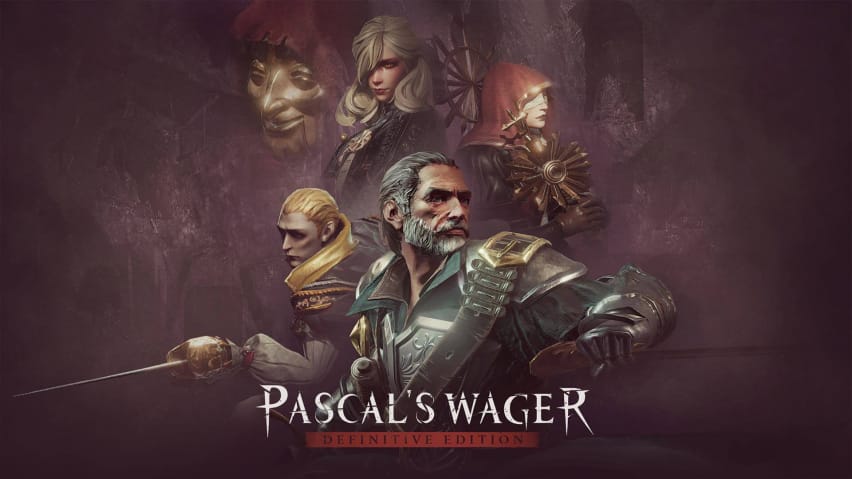
If you’re unfamiliar with the terms of Pascal’s wager, it goes thus. Believing in God is better than not believing because if you don’t believe and God is real, you’ll be punished, whereas if you do believe and God doesn’t exist, you’ve lost nothing. It’s a thorny philosophical issue that has many refutations and analyses, but more importantly, it’s also the name of a 2020 Soulslike released on mobile devices. Now, it’s making its way to Steam in the form of Pascal’s Wager Definitive Edition, giving PC gamers everywhere the chance to check it out.
Though every game taking influence from Dark Souls doesn’t necessarily deserve to be compared directly to it, there really is no other approach for Pascal’s Wager. Everything, from the menu designs to many of the enemy types and environments, is clearly directly “inspired by” From Software’s oeuvre. As with every Soulslike, it’s a high bar to clear, but Pascal’s Wager brings some new ideas to the table that set it apart from many of its also-ran peers. Despite its relatively humble origins, Pascal’s Wager may well be worth your while if you’re a fan of this genre.
Pascal’s Wager’s Story Is A Complete Mess
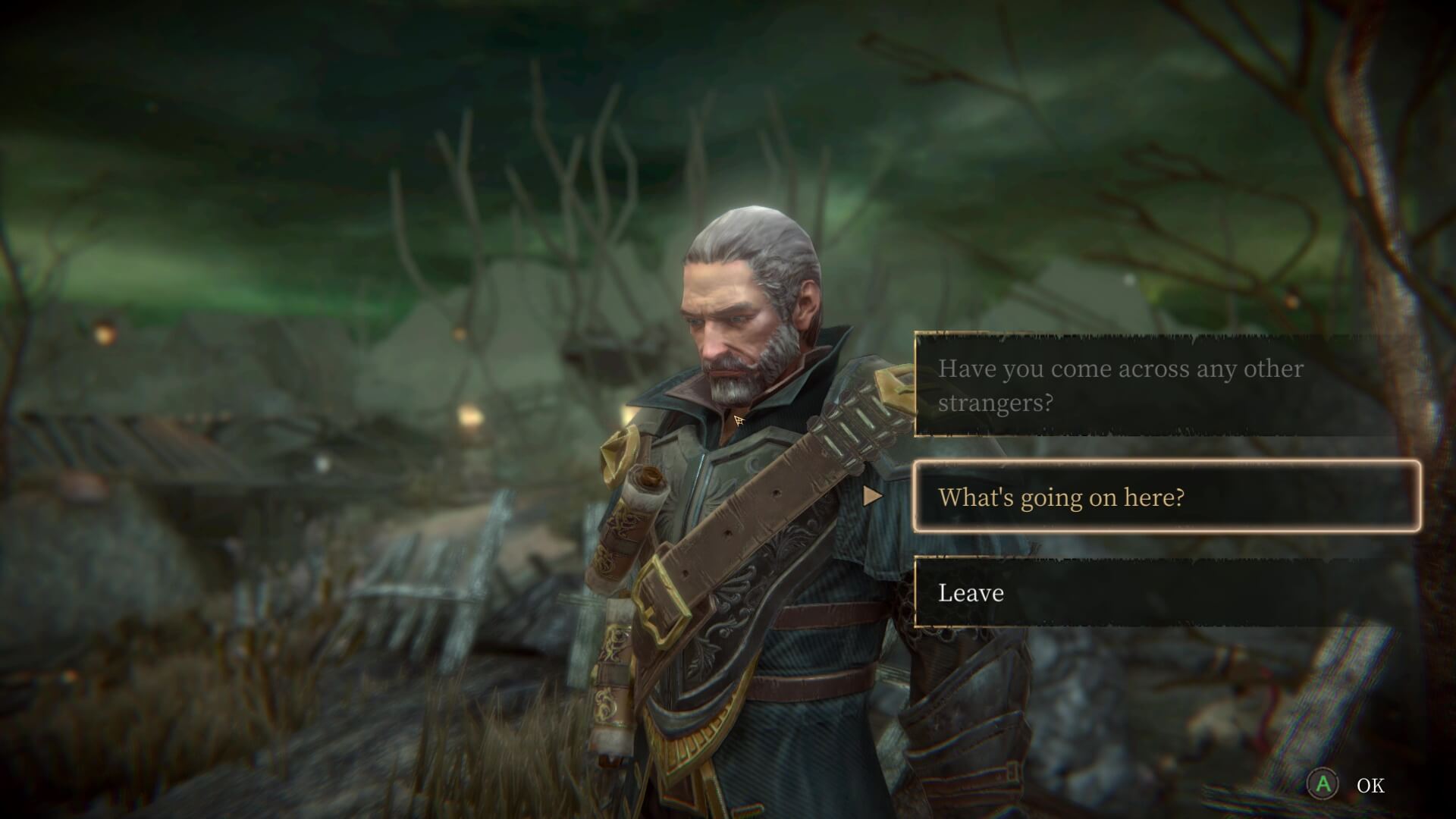
To put it simply, Pascal’s Wager just yammers on far too much. Every single narrative beat is ensconced within a cutscene, with plenty of awkward expository dialogue. It doesn’t help that the voice acting and writing here are stilted and strange. It might be a translation issue, but the voice actors deliver their lines as if they have no idea what they mean, and all of the protagonists are wooden and uninteresting. Honestly, it’s a feeling I shared. After a while, I simply stopped following the story because it was so poorly-told. Pascal’s Wager could do with taking its hand off the tiller and letting the world tell its own story, because the sheer number of cutscenes and dialogue sequences here is suffocating, and they’re not well-crafted.
The setup for Pascal’s Wager is strong. The world of Solas is afflicted by the Dark Mist, an encroaching eldritch fog that creates monsters. Once, the Colossi protected humanity from this mist, but a mysterious plague has caused them to fall one by one. It’s up to you to protect those you can protect from the Mist while discovering the truth behind the death of the Colossi. This setup hits all the requisite Soulslike beats: it’s dark, ambiguous, and full of grandeur. That’s why it’s such a shame that Pascal’s Wager simply can’t leave well enough alone when it comes to the telling.
That’s not to say there aren’t individual moments that work. Sometimes, you’ll come across a character with a fascinating story, like the fellow in Exilium who was beheaded and seeks a cure for his curse, or the young girl in Adamina whose mother is missing. These individual stories resolve themselves in compelling, emotionally involving ways. It’s just a shame that the overarching narrative doesn’t have the same clarity of expression. If you want a slowly unfolding picture of a world gone mad, you could do worse than Pascal’s Wager, but it’s a picture with several coffee stains where key elements should be.
Combat In Pascal’s Wager Is Stiff But Fascinating
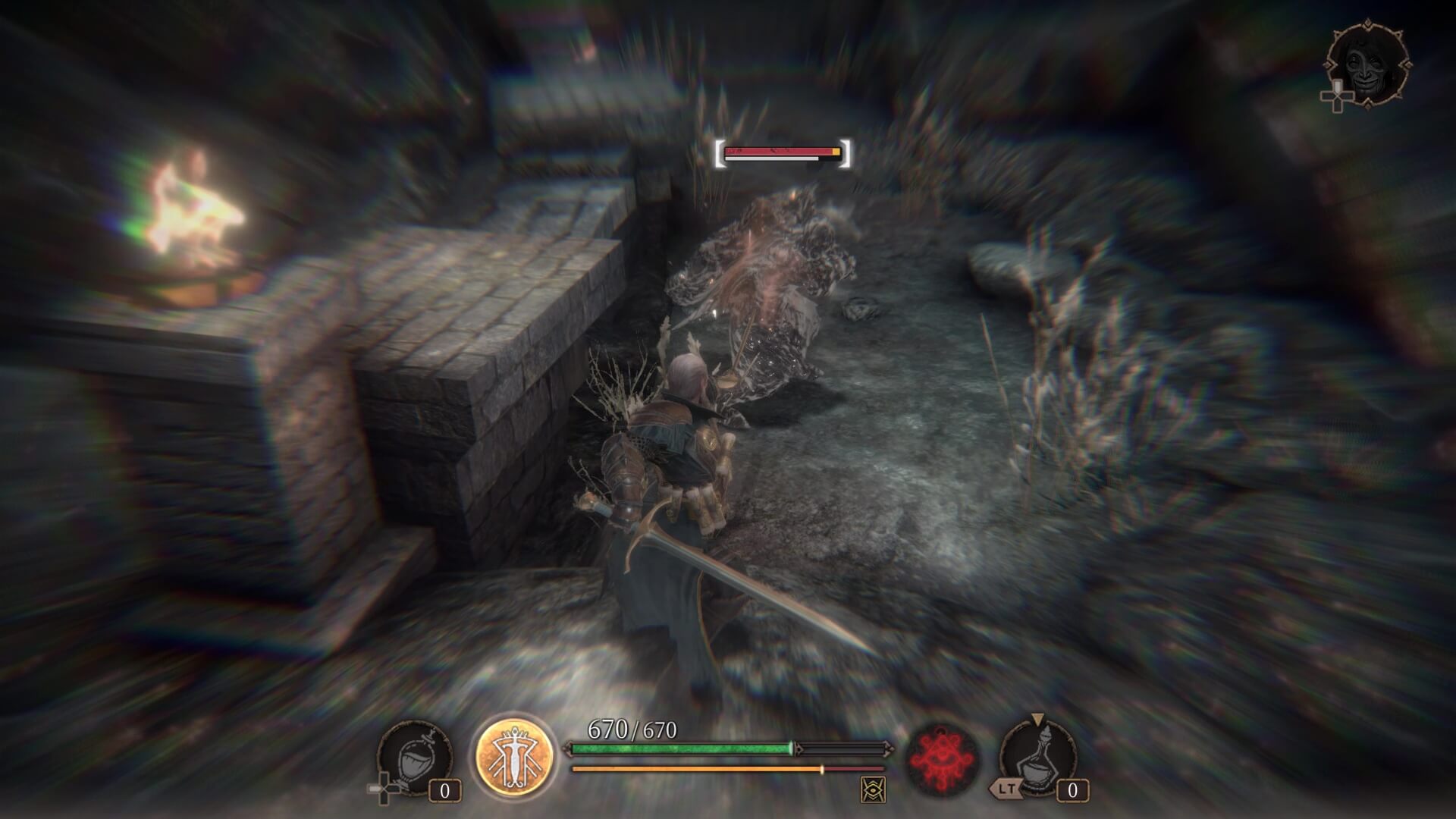
Happily, Pascal’s Wager fares much better in the gameplay stakes. On the face of it, combat is the standard Soulslike volta. Enemies have set attack patterns, you must spot their tells and exploit them, and you’d better watch your stamina if you don’t want to find yourself suddenly stunlocked. However, unlike most Soulslikes, Pascal’s Wager takes an almost Castlevania III-style approach to proceedings by featuring multiple named characters of fixed classes. The protagonist, Terrence – a swordsman with pretty average stats – is mandatory for all missions, but you can bring along one of three buddies, too, and you’ll need to if you want to overcome some of the challenges on offer.
Initial impressions aren’t great. Movement in Pascal’s Wager feels stiff and difficult. Getting a handle on the dodge and block mechanics isn’t easy, and just like in Souls games, the hitboxes here are almost impressively broken in places. However, once you start learning enemy tells and the intricacies of your party’s moves, combat opens up and becomes easier. Pascal’s Wager has that quality that good action-RPGs have. You’ll start off struggling, but once you master the feeling of movement and the balletic feel of combat, you’ll soon find yourself dispatching foes with haste.
That goes for the most part, anyway. Some late-game enemies feel disgustingly cheap, with instant stun or parry moves that are impossible to predict. When that happens, the stiffness of Pascal’s Wager’s movement becomes a problem. Dodging through attacks is often your only recourse to making sure you’re not hit by them, but that can feel impossible given the wide sweep and seemingly perfect aim of some enemies. This is a fairly minor gripe, though. Each enemy can be mastered through careful observation and exploitation, and that in itself is commendable.
Pascal’s Wager Has Plenty Of Great Enemies To Fight
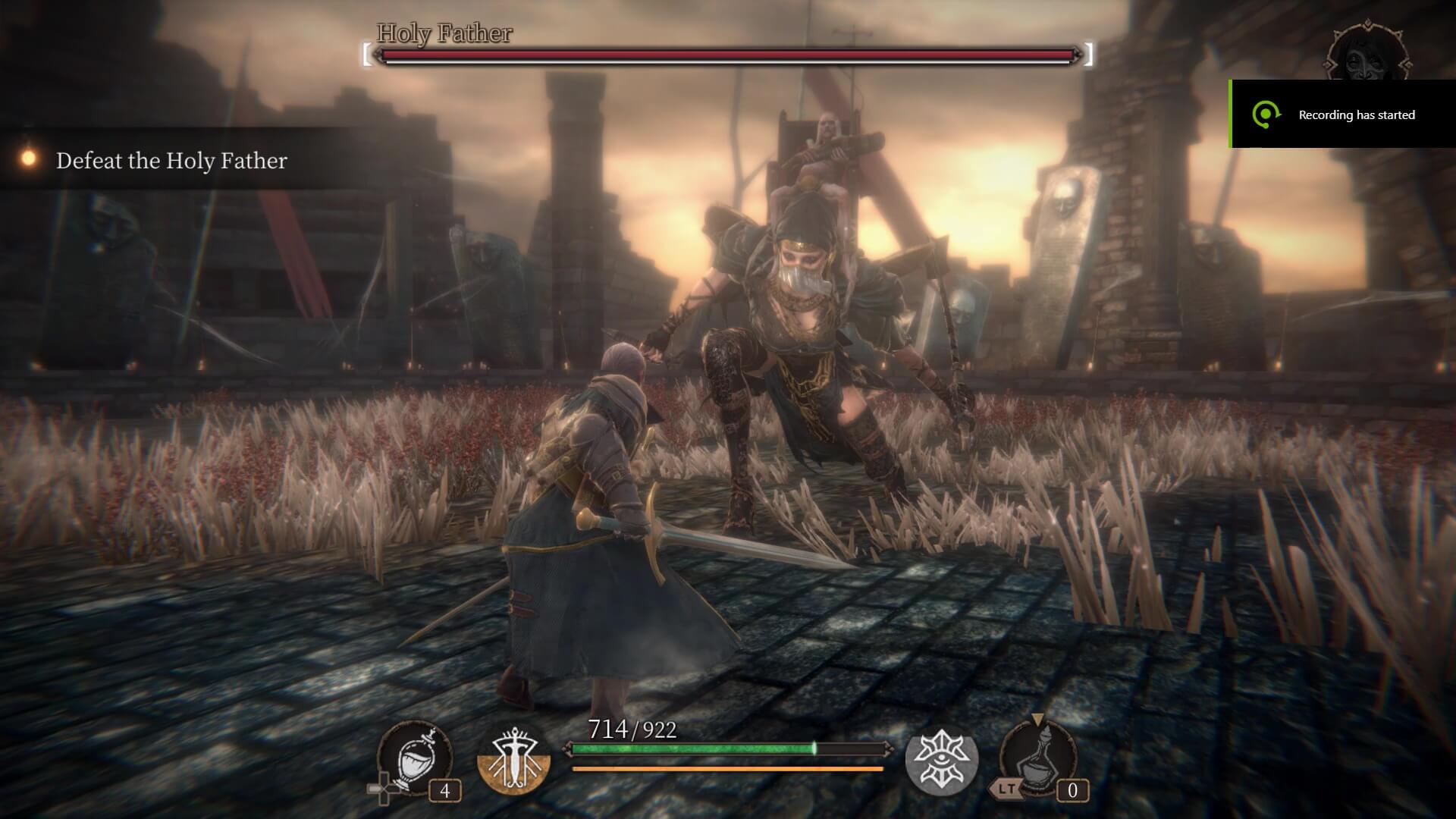
Often, one of the most disappointing aspects of a Soulslike is enemy variety. Dark Souls is great because even though its combat is fairly rudimentary, it has such a massive variety of enemies to fight that it still feels deep and complex. Remarkably, Pascal’s Wager – despite its mobile origins – boasts more enemy variety in its opening level than some games do across their entire playtime. They’re not just variations on “man with sword”, either. There are some impressively grotesque and creative enemy designs on display, and each one is genuinely unpredictable when it comes to attacks without feeling unfair.
That variety continues for an impressively long time. Even into the back half of the game, I was still encountering totally new enemies with no idea how to deal with them. The ways in which Pascal’s Wager sets up its encounters are well-thought-out and creative, too. It’s clear the designers have put a lot of thought into how enemy encounters will work mechanically and whether you’ll be able to handle certain combinations of enemies. Sometimes, things can feel a little cheap – again, later parts of the game feel a little like they’re simply throwing high numbers at you in place of difficulty – but for the most part, it works.
Of course, for enemy variety to be truly meaningful, the enemies must have a clear, discernible place in the narrative. Once again, it’s here that Pascal’s Wager falls down. After a certain point, the creative excellence of the enemy designs felt hollow. I was never quite sure why certain creatures looked the way they did, or how they fit into the world as a whole. If all you want is to fight some interesting monsters, Pascal’s Wager delivers more than any of its peers could ever hope to. However, probing for deeper significance won’t reward you in the slightest.
Exploration In Pascal’s Wager Feels Rewarding
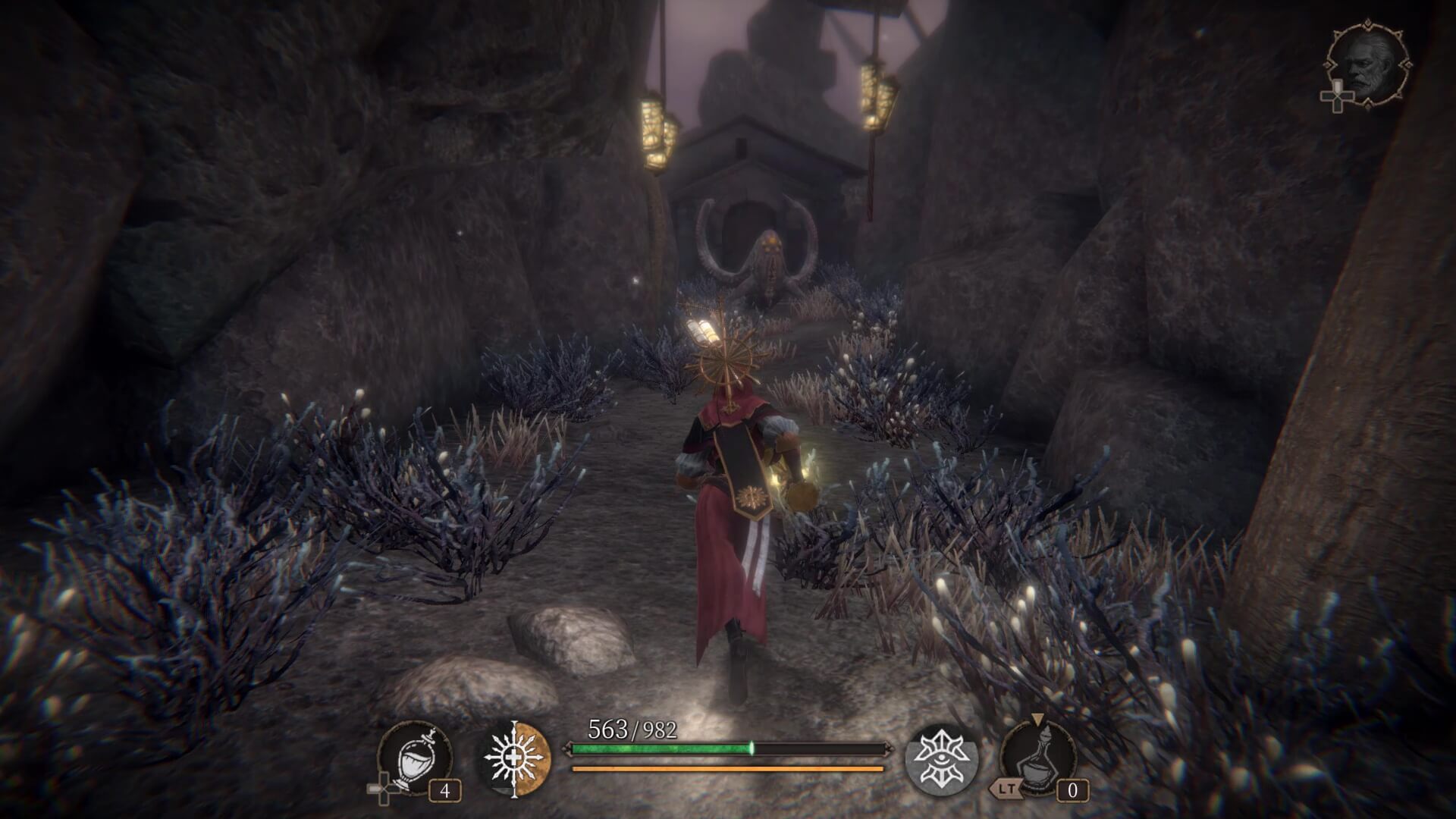
Level design is another area in which Pascal’s Wager excels. Each stage is a labyrinthine construction full of shortcuts, secrets, and well-hidden exploration rewards. Most of the things you find while you’re exploring are tangible, genuine benefits. Sometimes, you’ll find story documents, which are less rewarding because they’re uniformly terribly written. Despite this, when you’re at the end of a long path and discover a new upgrade item or skill tree bonus, you’ll jump for joy because taking that circuitous route feels worth it.
Visually, the levels are…fine. Pascal’s Wager never quite moves beyond “murky forest” and “grandiose castle” for its environments, but it executes those well-trodden concepts with aplomb. These are some of the better murky forests and grandiose castles Soulslikes have to offer. There’s almost always something hidden at the end of a path. I got the feeling the developers had spent a lot of time playtesting environments and watching player routes to see where they should place rewards, and the hard work has paid off because discovering new areas and routes in levels always felt great.
If you’re into Pascal’s Wager’s aesthetic and vision, there’s plenty of it to explore, too. There are only a handful of levels, but they’re all massive, intricate spaces with multiple layers of elevation. Each checkpoint is a hub for numerous shortcuts, each of which instills that familiar “oh, that’s where I am!” feeling. When exploration in a Soulslike falls flat, levels can turn into chores, but that’s not a problem Pascal’s Wager suffers from. It needs more environment variables, and there are a couple of slightly questionable checkpoint placements, but these won’t spoil your enjoyment of hunting through its nooks and crannies.
Pascal’s Wager | Final Thoughts
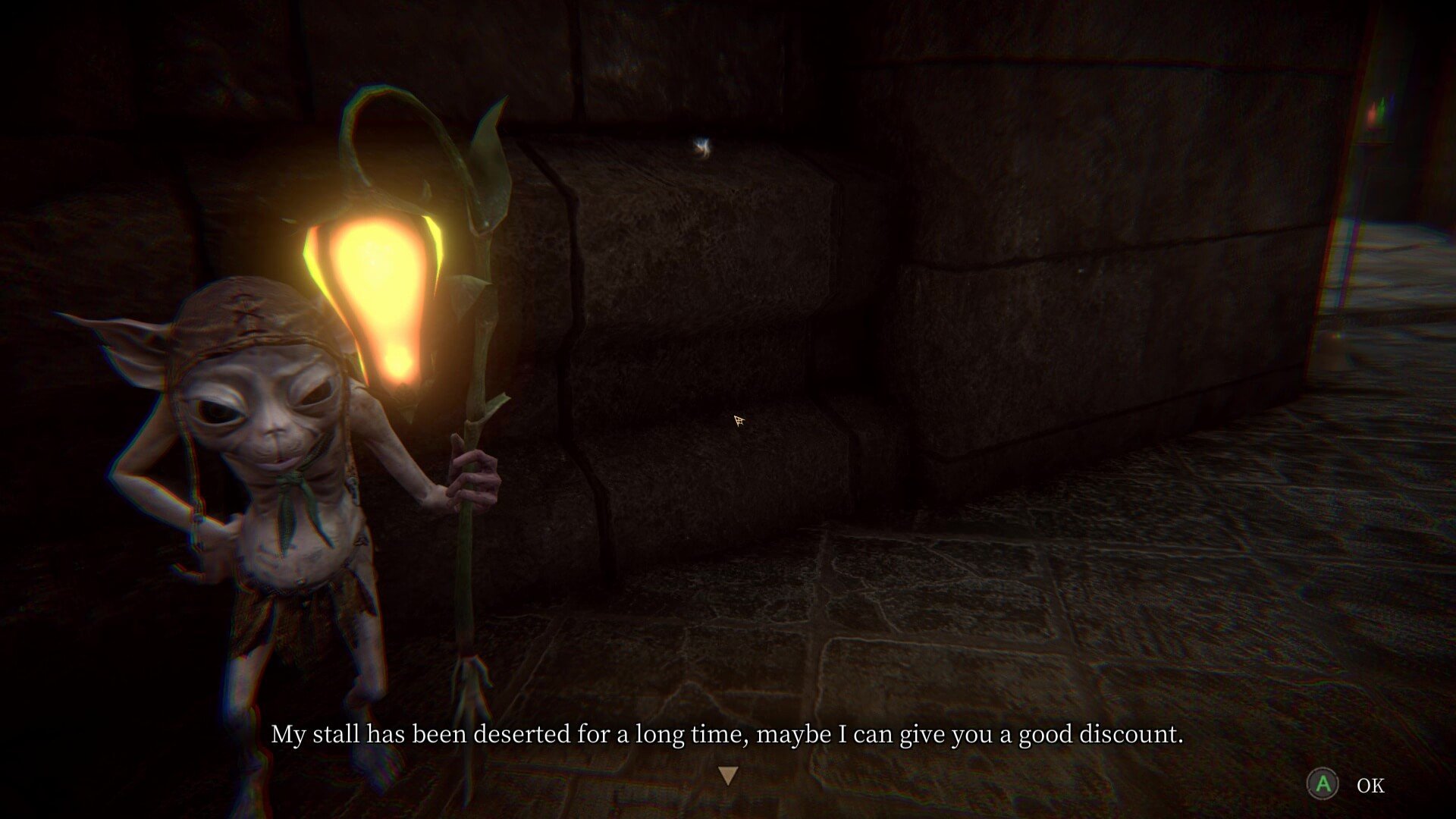
For the most part, Pascal’s Wager is a fine example of a Soulslike. Its rewarding exploration, impressive enemy variety, and range of combat options make it an enjoyable experience for anyone concerned with the mechanical aspects of the genre. It’s just a shame that it falls so utterly, utterly flat in the narrative department. Pascal’s Wager’s terrible story, awful voice acting, and laughable attempts at characterization belie a game with huge amounts of potential. The developers’ next game is going to be one to watch, but this flawed gem is well worth your while if you just can’t get enough Soulslike masochism.




